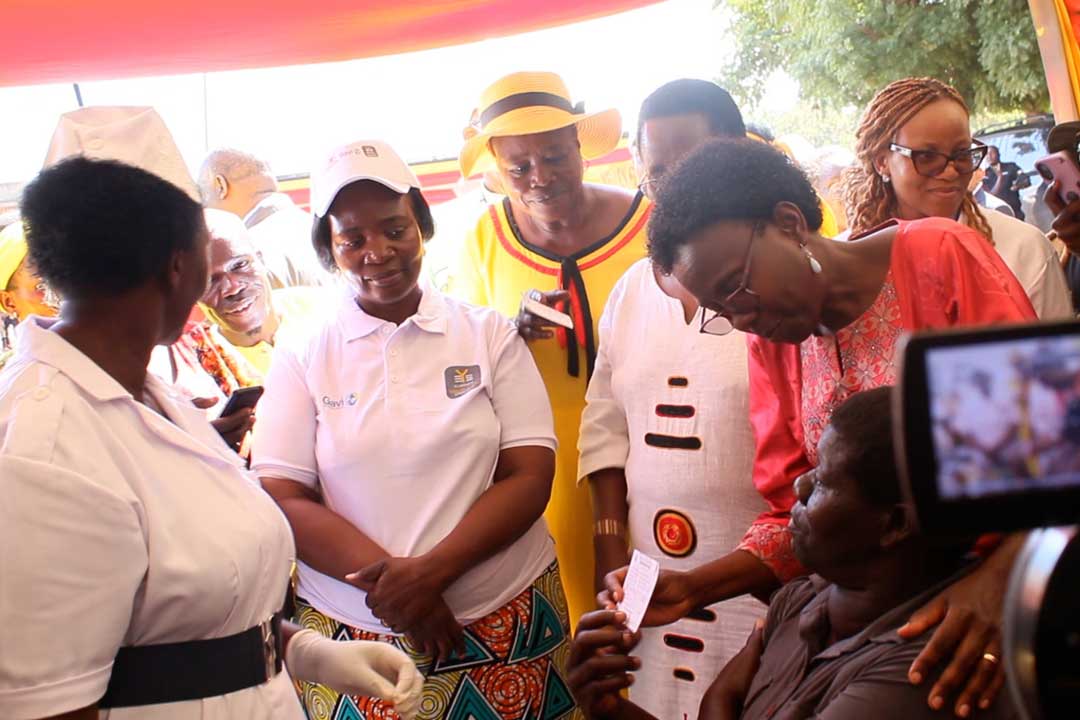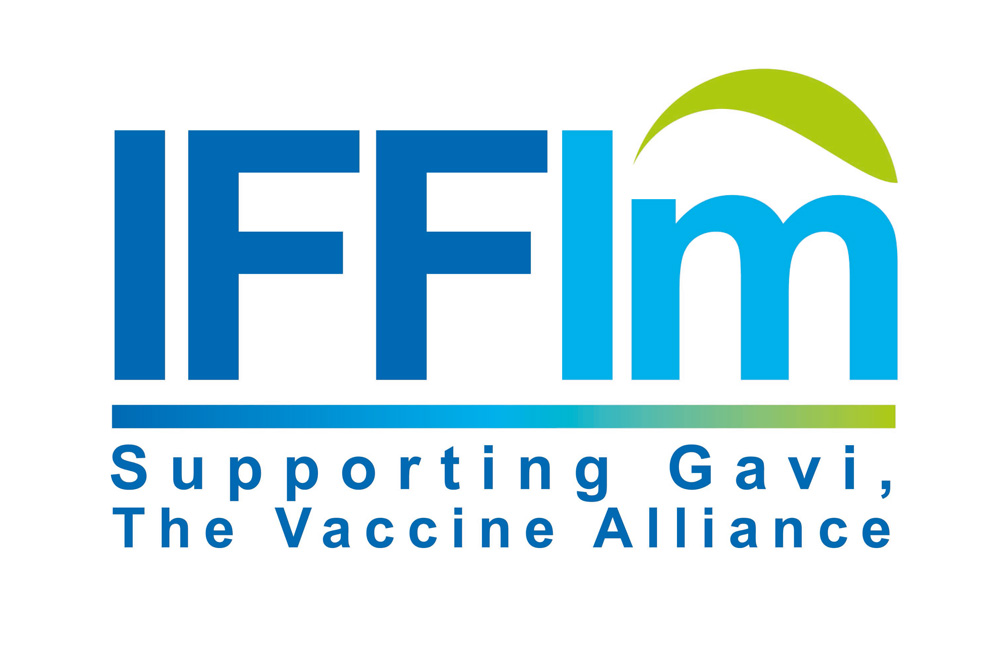Ugandan public gets serious about knocking back yellow fever
- Impact
- Ugandan public gets serious about knocking back yellow fever
Ugandan public gets serious about knocking back yellow fever
21 August 2023

Sister Goretti vaccinating infants at Lira referral hospital. Credit: Esther Nakkazi
Months after a major mass preventive vaccination drive, clinics are still seeing streams of people coming in to ask for the jab, say happy health workers.
Months after a major mass preventive vaccination drive, clinics are still seeing streams of people coming in to ask for the jab, say happy health workers.
Announcements
IFFIm impact: Yellow fever
IFFIm has disbursed a total of US$ 306 million to Gavi for yellow fever vaccines, stockpiles and campaigns since 2006.
Two months after a Uganda-wide mass vaccination campaign against yellow fever was launched in Lira city, the Lira Regional Referral Hospital is seeing enduring demand for the jab.
"Every day, we see about five to ten individuals coming in to request vaccination," says Peter Okello, the hospital's administrator.

The campaign, which kicked off in early June and targeted 13.3 million Ugandans aged nine months to 60 years of age, was a roaring success in Lira. Here, vaccination coverage exceeded 100%, with an impressive 12,000 vaccines administered, surpassing the initial target of 10,000 for the campaign week. "The demand was considerable, prompting us to request additional supplies," Okello explains.
Previously available on a paid basis through private health providers and deployed principally for travellers, the yellow fever vaccine this year became an integral part of the routine immunisation programme in Uganda, meaning it is now offered free-of-charge to every infant at age nine months.
According to the World Health Organization (WHO), the vaccine provides effective immunity within 10 days for 80–100% of recipients, and within 30 days for over 95% of recipients, and is protective for life after a single dose.

Credit: Goodluck Musinguzi
"Uganda is committed to controlling yellow fever transmission," Health Minister Dr Jane Ruth Aceng Ocero said in a statement. "Vaccines remain the main tool we have to efficiently prevent and contain yellow fever outbreaks."
Dr Daniel Kyabayinze, Director of Public Health at the Ministry of Health, says the goal of the yellow fever campaign and of the vaccine's introduction into the routine schedule is to eliminate yellow fever epidemics by 2026, which in turn is also the core goal of the global Eliminate Yellow Fever Epidemics (EYE) Strategy. "Introducing yellow fever into routine immunisation will ensure that all children under one year are protected against yellow fever," says Kyabayinze.
Sister Goretty Alinga, a senior assistant nursing officer at Lira Regional Referral Hospital and a vaccinator, was on the frontlines during the bustling campaign week in Lira.
"On the first day, I vaccinated 196 people, and on the campaign's final day, around 396 individuals received the jab from me,' she recounts. As a public health nurse, Alinga says she is an advocate of prevention over cure. She attests to heightened awareness of yellow fever in her community due to the vaccine campaign.
Pregnant women are not always excluded from yellow fever vaccine campaigns, but in this case they were. "We had to turn pregnant women away, but now after giving birth, they are coming to get the vaccine and bringing their children too," says Alinga.
“We had to turn pregnant women away, but now after giving birth, they are coming to get the vaccine and bringing their children too."
– Sister Goretty Alinga, nurse and vaccinator
The hospital offers yellow fever vaccines from Monday to Friday on a walk-in basis. "Men are usually impatient – when they decide to get vaccinated they don't like waiting," she says.
In the lead-up to the campaign, messages about the severity of the disease and significance of the vaccination drive were disseminated through various means. In Lira, messages were broadcast by community megaphones in markets and on streets, encouraging mobilising communities to converge on the designated dates.
Radio talk shows were conducted, conducting discussions on the vaccine's importance, with religious and political leaders weighing in in support of the vaccine via various channels. Notably, the campaign's launch was led by the Minister of Health, who is also the area's Member of Parliament and a native of the region.
Says Alinga, "The messages disseminated during the campaign truly raised awareness about the significance of vaccination and increased people's knowledge about yellow fever."
Uganda is considered a high-risk country for deadly, mosquito-transmitted yellow fever. Outbreaks are expected to occur every three to five years. In the year 2022 alone, the country witnessed two confirmed cases of yellow fever in Wakiso and Masaka districts.
But the recent vaccine push should change that threat profile. A 2021 research paper published in PLOS Medicine found that implementing vaccine campaigns was associated with an 86% reduction in the risk of yellow fever outbreaks in 34 African countries.
For Ugandans who missed the campaign window, the vaccine is now fortunately much nearer at hand. Speaking to a local radio station, Filbert Oketch, a Lira businessman, said: "Previously, it was expensive and cumbersome for individuals like me to go to Kampala for vaccination before travelling."
Despite the successes of the campaign in generating enthusiasm for the vaccine, it did reportedly prompt confusion for the most ancillary and bureaucratic of measures: a change in colour of the vaccination card. Expecting the traditional yellow, vaccination recipients were issued instead with a white card.
"The white card bears a government stamp, but people are used to getting a yellow card, not a white one. We have tried to explain that it is still valid, but they still complain," said Alinga.
Francis Ogwang, responsible for the Lira district cold chain, adds another layer to this concern. While it's possible for individuals who have received the vaccine to acquire a certificate online by entering their National ID information, this option poses challenges for many in the local community who lack access to the internet.
More importantly, though, Ogwang affirms that the cold room at the district retains sufficient doses to meet the ongoing demand. The available stock is slated to expire in 2024.
“If we vaccinate at least 80% of the population, we shall be able to eliminate yellow fever epidemics.”
– Dr Daniel Kyabayinze, Director of Public Health, Ministry of Health
In addition to public health facilities, the private sector is also allocated vaccines for administration to the public, free of charge. "They maintain records and share them with us for oversight," Ogwang explains.
Kyabayinze offers a hopeful picture of the future. "These campaigns are not a response to any outbreak, but they are to stop future outbreaks, and that's why they are termed preventive," he says. "If we vaccinate at least 80% of the population, we shall be able to eliminate yellow fever epidemics."

|
This article is republished from VaccinesWork under a Creative Commons license. Read the original article. VaccinesWork is an award-winning digital platform hosted by Gavi, the Vaccine Alliance covering news, features and explainers from every corner of global health and immunisation. |
Share this article
Restricted Access Library
 The material in this Restricted Access Library is intended to be accessed only by persons with residence within the territory of a Member State of the European Union and is not intended to be viewed by any other persons. The material in this Restricted Access Library is provided by IFFIm for information purposes only and the materials contained herein were accurate only as of their respective dates. Certain information in the materials contained herein is not intended to be, and is not, current. IFFIm accepts no obligation to update any material contained herein.
The material in this Restricted Access Library is intended to be accessed only by persons with residence within the territory of a Member State of the European Union and is not intended to be viewed by any other persons. The material in this Restricted Access Library is provided by IFFIm for information purposes only and the materials contained herein were accurate only as of their respective dates. Certain information in the materials contained herein is not intended to be, and is not, current. IFFIm accepts no obligation to update any material contained herein.
Persons with residence outside the territory of a Member State of the European Union who have access to or consult any materials posted in this Restricted Access Library should refrain from any action in respect of the securities referred to in such materials and are otherwise required to comply with all applicable laws and regulations in their country of residence.
By clicking Access restricted content: DYNAMIC-LINK-TEXT I confirm that I have read and understood the foregoing and agree that I will be bound by the restrictions and conditions set forth on this page.
The materials in this Restricted Access Library are for distribution only to persons who are not a "retail client" within the meaning of section 761G of the Corporations Act 2001 of Australia and are also sophisticated investors, professional investors or other investors in respect of whom disclosure is not required under Part 6D.2 of the Corporations Act 2001 of Australia and, in all cases, in such circumstances as may be permitted by applicable law in any jurisdiction in which an investor may be located.
The materials in this Restricted Access Library and any documents linked from it are not for access or distribution in any jurisdiction where such access or distribution would be illegal. All of the securities referred to in this Restricted Access Library and in the linked documents have been sold and delivered. The information contained herein and therein does not constitute an offer for sale in the United States or in any other country. The securities described herein and therein have not been, and will not be, registered under the U.S. Securities Act of 1933, as amended (the "Securities Act"), and may not be offered or sold in the United States except pursuant to an exemption from, or in a transaction not subject to, the registration requirements of the Securities Act and in compliance with any applicable state securities laws.
Each person accessing the Restricted Access Library confirms that they are a person who is entitled to do so under all applicable laws, regulations and directives in all applicable jurisdictions. Neither IFFIm nor any of their directors, employees, agents or advisers accepts any liability whatsoever for any loss (including, without limitation, any liability arising from any fault or negligence on the part of IFFIm or its respective directors, employees, agents or advisers) arising from access to Restricted Access Library by any person not entitled to do so.
"Relief" for mothers in Bayelsa state as malaria vaccine makes waves
07 November 2025
